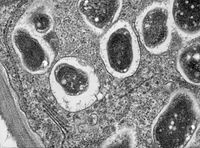
Photo from wikipedia
Abstract In the past years, breeding programs have been mainly addressed on pushing the commercial features, forgetting important traits, such as those related to environmental stress resilience, that are instead… Click to show full abstract
Abstract In the past years, breeding programs have been mainly addressed on pushing the commercial features, forgetting important traits, such as those related to environmental stress resilience, that are instead present in wild relatives. Among the traits neglected by breeding processes, the ability to recruit beneficial microorganisms that recently is receiving a growing attention due to its potentiality. In this context, this review will provide a spotlight on critical issues of the anthropocentric point of view that, until now, has characterized the selection of elite plant genotypes. Its effects on the plant-microbiome interactions, and the possibility to develop novel strategies mediated by the exploitation of beneficial root-microbe interactions, will be discussed. More sustainable microbial-assisted strategies might in fact foster the green revolution and the achievement of a more sustainable agriculture in a climatic change scenario.
Journal Title: Horticulture Research
Year Published: 2022
Link to full text (if available)
Share on Social Media: Sign Up to like & get
recommendations!